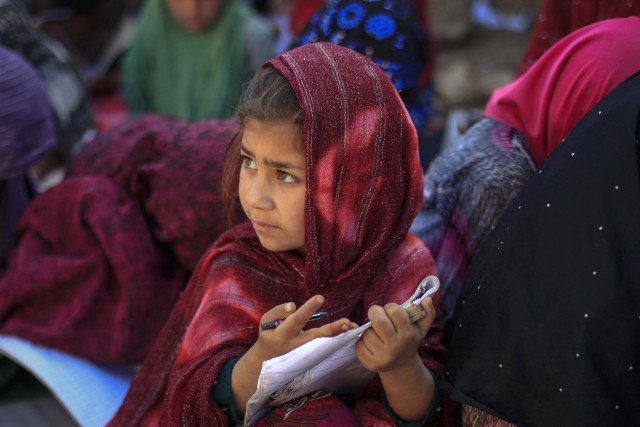Education for all: ‘Free schooling bill to be tabled in May’
Cabinet has approved draft bill, minister says.

A girl attends a class at a makeshift school on the outskirts of Islamabad April 7, 2014. PHOTO: REUTERS/FILE
Education Minister Rana Mashhood Ahmad Khan said on Friday the Punjab cabinet had approved a bill for the right to free and compulsory education.
Speaking to The Express Tribune, he said the legislative process would be taken forward when the bill was put before parliamentarians during the next Punjab Assembly’s session.
The bill, he said, had incorporated suggestions and proposals put forth during several consultations over the years.
He said the bill proposed a mechanism that assigned some responsibilities not only to provincial and local governments but also private schools and madrassahs.
The bill has been under deliberation since 2012 after the formation of the Punjab Education Commission (PEC).
The PEC, headed by Justice (r) Khalilur Rahman Khan, had handed in a draft of the bill to the School Education Department in November 2012, almost two years after the legislation of Article 25-A of the Constitution.
Parliamentarians from the Pakistan Muslim League-Quaid (PML-Q) had also come up with their own draft bill on December 24 the same year.
Approved bill
The approved draft makes 10 years of education – grade 1 to grade 10 – a right of every child between five and 16 years of age.
It defines “free education” as provision of these 10 years of education free of cost. The definition requires the government to remove any financial barriers to the exercise of the right.
The bill also takes into consideration the need and age related challenges by including non-formal and vocational education as part of the right to free and compulsory education.
Provincial government and local authority
The law makes it mandatory for the provincial government to ensure quality education and preparation of records of children admitted and retained at schools. While the financial responsibility to execute the provisions of the bill will lie with the provincial government, it may seek assistance from the federal government.
Under the bill, the local governments and authorities have been tasked with several responsibilities, including maintenance of records of children of up to 16 years, monitoring of attendance records and completion of education.
Private Schools
The bill lays down that 10 per cent of the strength of a class will be provided free and compulsory education in private schools and madrassahs registered with the government. The rule will apply to every class. Private schools have also been prohibited from requiring parents to pay any money other than tuition, admission and security fee or to force them to purchase school articles such as books from a specific vendor.
Private schools, funded in part by governments, will also be required to provide free education to children in accordance with the grant received and costs incurred.
Other provisions
Utilisation of school buildings during evening hours, introduction of pre-school education for children above three years of age, prohibition of corporal punishment, teacher performance and accountability, establishment of school management bodies and a Farogh-i-Taleem fund – for the welfare of students – have also been made part of the bill.
Parents who fail to send children to schools, with the exception of reasons such as mental incapacity of a child or absence of a school within a two-kilometre radius of their residence, will not be entitled to any subsidy or poverty targeted support of the government.
The bill provides for a penalty of six-month imprisonment or a Rs50, 000 or both to individuals found contravening the provisions of the bill.
Reservations
While the bill has been approved by the cabinet, its contents have not been made public. The All Pakistan Private Schools Management Association has expressed reservations over this. Association president Adeeb Jawadani said the government had not taken the private sector on board.
Idara-i-Taleem-o-Aagahi Director Baela Raza Jamil demanded that the government open the approved draft bill for public discourse. She told The Express Tribune legislation of the bill was being done in secrecy.
Published in The Express Tribune, April 27th, 2014.



















COMMENTS
Comments are moderated and generally will be posted if they are on-topic and not abusive.
For more information, please see our Comments FAQ